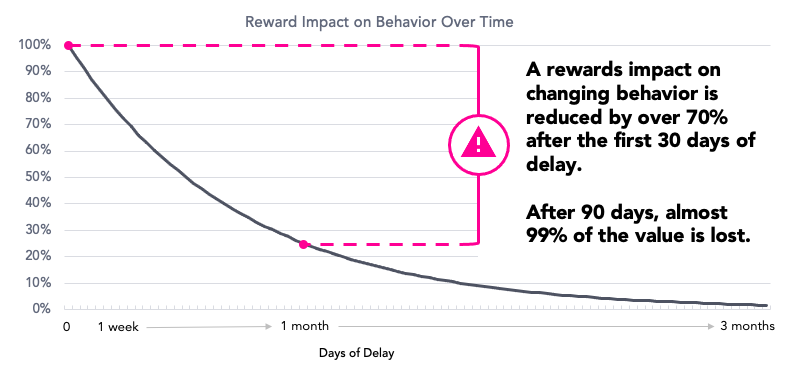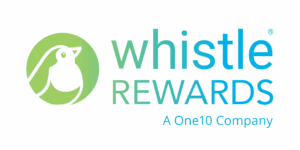Employee Rewards: Time is the Enemy
Time is the most important and most overlooked factor of rewards programs
Have you ever potty-trained a puppy? If you have, then you know the importance of timing. Research has found that dogs have a short-term memory of about 27 seconds. When your dog does something good or bad, you have to respond within that time frame for the dog to have any understanding of the relationship between his actions and yours. Humans are a lot smarter than puppies (less cute though), but we experience the same phenomenon[1]. When we are rewarded immediately, the impact is much larger than a reward coming days or weeks later.
When you reward employees, you do so partly to show appreciation. But much of the reason for rewards also relates to the concept of operant conditioning: The reward is a “reinforcer” that makes the desired behavior more likely to happen again in the future. Someone does something amazing. You reward them for their accomplishment, and that reward means they will go the extra mile in the future to experience those benefits again.
When giving rewards, the most critical and overlooked element is timing. Unfortunately, most companies that offer rewards are forced into long delivery delays. Many companies pay rewards at the end of the month in a pay cycle. Others use points as immediate rewards, but then it takes months for the employee to build up enough points to have any value. Some companies attempt to recognize employees at the end of the year, pleading with managers to recall good deeds from the past twelve months. All these scenarios result in a dissociation on the part of the employee between the behavior earning the reward and the positive consequence (the reward itself). When this connection is lost, the reward may build morale, but it will cease to influence future behavior. You are likely spending millions in rewards and failing to achieve the primary purpose.
 Nature provides a clear example. For actions that put our survival or safety at risk, nature has hardwired us with short feedback loops precisely because they are the surest way for us to learn that X action has Y consequence. Of course, the underlying reason for this is not the learning itself, but rather the change to future behavior. Take the example of a child putting his hand on a hot stove. He feels the consequence (pain) immediately. Not only does he withdraw his hand, but – importantly – he does not touch hot stoves in the future. If the child’s hand burned an hour after touching the hot stove, that child would be much slower in associating the pain with the stove, and the lesson for his future behavior would be lost.
Nature provides a clear example. For actions that put our survival or safety at risk, nature has hardwired us with short feedback loops precisely because they are the surest way for us to learn that X action has Y consequence. Of course, the underlying reason for this is not the learning itself, but rather the change to future behavior. Take the example of a child putting his hand on a hot stove. He feels the consequence (pain) immediately. Not only does he withdraw his hand, but – importantly – he does not touch hot stoves in the future. If the child’s hand burned an hour after touching the hot stove, that child would be much slower in associating the pain with the stove, and the lesson for his future behavior would be lost.
On the positive side, the short feedback loop concept is important for designing effective employee rewards. Multiple studies have shown that each day of delay between an employee earning a reward and the physical payment of that reward reduces the perceived value by ~5%[2]. That means a two-week delay will reduce the value of your reward by 50%[3]. A 30 day delay reduces that value to almost zero. Employees are still happy to receive a payment whenever it arrives. But the association between the reward and the actions they executed to earn the reward declines quickly. Once this connection is lost, the impact on future behavior is lost as well, and your reward is simply a “thank you” vs. a driver of future business success.

Figure 1 – The ability of an employee reward to impact behavior declines with each passing day.
3 changes to your employee rewards strategy to consider
To increase the impact that a reward has on future employee behavior, you can make a few simple changes to your employee rewards strategy:
- Deliver the reward as quickly as possible – ideally even immediately – following the behavior that earned it. A modern technology partner, like Whistle Systems, can help you do this easily and with no cost to you.
- Make it as easy as possible for employees to enjoy their rewards. Delivering cash (rather than points or barely-wanted merchandise) directly to their mobile device allows them to choose the rewards that are most meaningful.
- Reward your employees frequently. Even small rewards, when provided in the moment, have a big impact.
If you’d like to learn more about how Whistle can help you maximize the effectiveness of your budget while working within your current rewards budget and infrastructure, contact us or sign up for a free demo.

Drew Carter is the CEO and Co-founder of Whistle. Drew brings a combination of executive leadership, business strategy, technical software experience and data analytics to his work. He has worked in large and small corporations, worked in industry building software products enjoyed by millions and served as a consultant helping companies better compete in the digital age.

Laurel Newman, is a behavioral scientist who specializes in creating interventions that help companies to improve the experiences and change the behaviors of their customers and employees. Her experience as a Psychology Professor turned Organizational Applied Behavioral Scientist provides her unique insight into the variety of forces that impact people’s thoughts, feelings, and behavior.
Whistle is the first learning platform to integrate the key elements that drive business outcomes – ability (microlearning), motivation (micropayments and recognition), cues (AI informed nudges and recommendations) while removing friction (simplified design and mobile centric approach). Together these multiply the impacts of microlearning to maximize the impact on business outcomes.
Footnotes
[1] Balsam PD, Drew MR, Gallistel CR. Time and Associative Learning. Comp Cogn Behav Rev. 2010;5:1-22. doi: 10.3819/ccbr.2010.50001. PMID: 21359131; PMCID: PMC3045055.
[2] Ohmura Y, Takahashi T, Kitamura N, Wehr P. Three-month stability of delay and probability discounting measures. Exp Clin Psychopharmacol. 2006 Aug;14(3):318-28. doi: 10.1037/1064-1297.14.3.318. PMID: 16893275.
[3] Woolley K, Fishbach A. It’s about time: Earlier rewards increase intrinsic motivation. J Pers Soc Psychol. 2018 Jun;114(6):877-890. doi: 10.1037/pspa0000116. PMID: 29771568.









